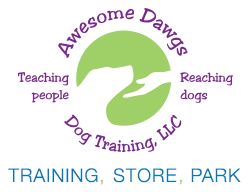Socialization. We hear this word often, but what does it mean?
Socialization is how puppies (key word here is PUPPIES) learn about their world including everyone and everything around them. How they perceive sounds, smells, touch, people, children, objects, surfaces, other animals, is learned very early in their life.
The socialization period for puppies (again, key word is PUPPIES) is between 3-12 weeks! Puppies that are not socialized at a young age can become fearful, anxious, aggressive, or develop troublesome behaviors as they become adults.
According to Puppy Start Right: Foundation Training for the Companion Dog– Kenneth M. Martin ,DVM & Debbie Martin, RVT,VTS (Behavior), CPDT-KA, KPA CTP:
- “Puppies must be properly socialized before 16 weeks of age.”
- “Puppies become progressively more fearful between 12 to 16 weeks of age with the demarcation of the socialization period”
- “The socialization period is the most influential learning period of a dog’s life with a lifelong effect on his personality and how he reacts to people, other animals and environments.”
What does this mean?
If you have or are getting a new puppy- YES you want to enroll in training as soon as possible! Every week you have your puppy you can be providing tons of positive experiences for him. Through our puppy classes you will learn how to socialize your puppy to set him up to be confident, happy and well behaved in his adult life.
- Positive experiences cannot be forced upon a puppy. They must be able to approach, explore and process at their own pace.
- They must feel safe at all times.
- They must have the ability to retreat or exit if they need distance or to find a safe place.
- Puppies should have hundreds of positive exposures every week.
- Puppies are literal sponges and they will soak in good information as well as the bad. Bad experiences can and often do last throughout their lifetime.
SOCIALIZATION AND OLDER DOGS
If you have an adolescent, young adult or adult dog- can you still ‘socialize’ him? Sadly, not in the true sense of “socialization”. If you are looking to enroll your dog into a training class to ‘socialize’ him to be less fearful, less anxious, or friendlier to other dogs or people, please be aware that he has a nearly or fully developed personality and at this point we need to take on an approach of intervention, teaching better behaviors, and perhaps modifying behaviors and emotional responses. Simply repeating exposures in a group class will not change his feelings of the things he fears or does not like, especially if he is overwhelmed. If a person has a fear of flying, will putting him onto lots of flights make that fear simply go away?
- You cannot teach an adult dog to “like’” people or other dogs through group training. You may be able to modify his emotional responses to people or dogs through Behavior Modification. Through this process, we work on desensitizing your dog to his triggers and counter-condition him to offer alternative behaviors.
- You cannot teach your dog to overcome extreme fear in a group class. This, too, is something requiring Behavior Modification in a safe learning environment.
- You cannot teach your dog to want to play with other dogs in a group class, just as you cannot make a dog like other dogs in a group class. Not all dogs like or want to play with other dogs. Some dogs like to play with 1 or 2 close buddies; other dogs like to tear around an open dog park with lots of dog friends. We cannot make them become social butterflies if they do not want to be that social.




